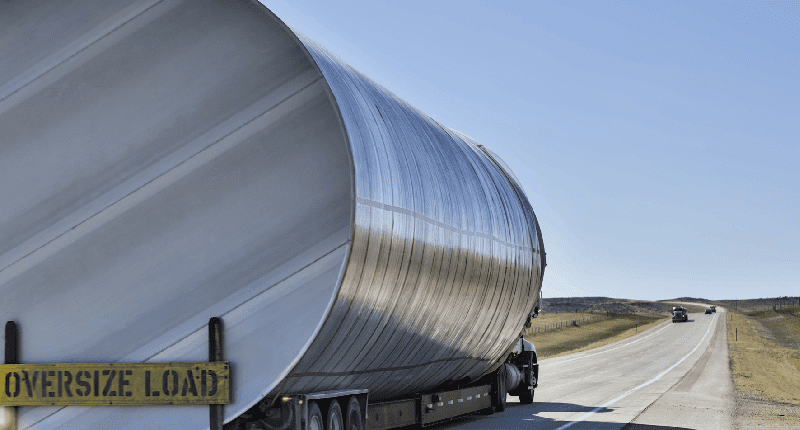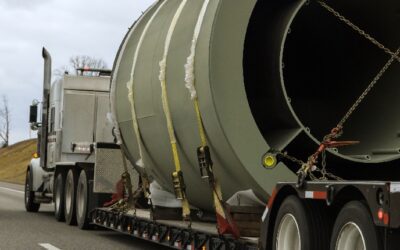How Do I Get an Oversized Load Permit?
Oversized loads comprise the materials, products, and equipment that keep businesses and the economy moving. But they are among the most complex shipments, requiring special permits, safety equipment, and escort vehicles like pilot cars. And, to further complicate the process, each state you travel through has different legal limits.
One thing is sure: if you are hauling an oversize load on any state highway and the size or weight exceeds the legal dimensions established by law, you will need to obtain an oversize/overweight permit.
Here’s what you should know:
What is Considered an Oversize Load?
An oversized load exceeds the maximum legal weight limits or dimensions. Each state has different legal limits. However, guidelines from the U.S. Department of Transportation (DOT) are as follows:
- Overall length: Maximum of 75’ from the front of the truck to the end of the load
- Width: Maximum of 8’6”
- Height: Maximum of 13’6” from the ground to the top of the load
- Gross weight: 80,000 lbs, including the truck, semi-trailer, and cargo with overhang

Determine Which Oversize Load Permits You’ll Need
Most oversize and overweight loads will require at least one of the following permits, depending on which entity owns the road on the chosen route:
- State-level oversize permits
- County-level oversize permits
- Township oversize permits
For example, you’ll need a state permit for freight moving along an interstate highway in Nevada or Arkansas, and cargo traveling on local roadways will require local permitting. Remember, you’ll need oversized load permits for non-divisible loads exceeding the legal dimensions restrictions for each state, county, and township they travel during transit.
What is the Difference Between Divisible and Non-Divisible Loads?
The rules and regulations governing motor carriers are designed to keep commercial and public motor vehicle drivers safe. Shipments of palletized items with standard configurations, axle spacing, and gross vehicle weights pose fewer issues for shippers. However, open-deck shipments are a different story, especially when their oversize loads pose a potential risk as they move along the highways.
Permits are required for oversized, non-divisible shipments, but what does that mean? Let’s first look at the definition of a divisible load: It’s a multi-piece shipment loaded in a way that increases one or more of the load’s dimensions beyond legally allowed limits. Shippers must remove the pieces that make the load oversized or overweight when necessary and possible and ship them separately. Conversely, non-divisible loads cannot be divided and require special permits for oversize loads.
Some states may offer exceptions to the divisible load laws and allow companies to obtain divisible load permits. As with non-divisible permits, divisible load permits are only good for a specific period. It’s worth noting that divisible load permits only apply to freight transported within that state and are not for interstate transport.
What are the Steps for Getting an Oversize Load Permit?
First, Plan Your Freight’s Route
Determine the best shipping route for your oversize cargo or superload before you look at obtaining trip permits. Because shipping over-dimensional loads can be costly, proper route planning is a must. Unfortunately, the planning process is typically so complicated that attempting it without professional assistance can be challenging or outright impossible.
Permit requirements and their costs change from state to state, making it imperative to work with an experienced third-party logistics service provider to plan your freight’s most efficient route before acquiring permits.
Decide What Types of Permits You’ll Need
As mentioned, you could obtain state, county, and local permits depending on your route. The most challenging aspect of oversized loads is that every state you move through could have different regulations. Motor carriers must be aware of and prepared to honor them when traveling through multiple states.
For instance, out-of-state carriers must obtain a Florida fuel permit before entering the state and remain with the vehicle while in the state. Florida oversize permits are required using the exact federal legal dimensions, including 80,000 gross weight and axle weights:
- Single-axle: 22,000
- Tandem axle: 44,000
- Tridem axle: 66,000
Carriers must consider the rules for pilot cars, permit limits, permit fees, and overlength regulations. They must have contact information for each permit office in the jurisdiction they will travel through and whether they can acquire annual permits or single-trip permits.
This is a lot for most shippers to keep track of, which is why many of them choose to work with third-party logistics services to take on the burden of trailer and truck permits.
Purchase the Required Permits
Once you know your route and the special permits you’ll need, buy them directly from the permit office or through a permit service.
Obtaining Permits Directly From Each Governing Body
Shippers and transportation providers must often have a pre-existing account with each governing entity to get an oversized permit in a state, county, or township. These accounts allow companies to obtain a permit quickly and relatively inexpensively since they eliminate the fees associated with using a permitting service.
If you can find a transportation provider with accounts in the areas you want to move a load through, you’ll save money and stick to your schedule. Securing permits is accessible with an account and some information, including the following:
- Transportation provider’s DOT number.
- Truck and trailer information.
- Make, model, serial numbers, license plate, state, equipment dimensions, axles, the spacing distance.
- In-depth descriptions of all freight.
- Height, weight, length, width
- Starting and ending points.
- Target transportation date.
Transportation companies must often sign contracts to hold these accounts and get permits for their customers. These documents certify the company’s ability to obtain permits and help expedite the process.
How To Obtain Permits from a Permit Service
You’ll need to use a permit service if you want to move freight independently but don’t have an account within the right areas. Permit services work on behalf of their clients to secure oversized permits, using their experience and knowledge of each state’s permitting requirements. Working with a permit service can save time and money as they use their expertise and connections to match your freight with the appropriate permits.
However, these companies might not help you plan your shipment route, so it’s up to you to prepare the most cost-effective route for your shipment and pay a permit service to secure the permits.
How Long Does It Take for Permits to Arrive?
The process should be quick if you have an active account with the states and jurisdictions you are moving through. For instance, permits for a flatbed with standard trailer length should take a few hours. Conversely, permitting may take longer if your freight’s total weight and dimensions exceed the limits (53 feet long, 14 feet wide, 13 feet, 6 inches high, and 45,000 pounds).
In some cases, large loads may have requirements to determine road conditions, construction limitations, and bridge engineering, increasing the wait to between two and six weeks.
Remove the Stress and Guesswork from the Permit Process
Although moving oversized and overweight freight can be challenging, it doesn’t have to be overwhelming. The logistics team at Titan Worldwide understands that obtaining oversized permits starts with planning. We have experience in route planning and determining heavy freight’s legal limits. Our team looks at all the variables and potential trouble spots to ensure your shipment reaches its destination safely and on time.
After completing the route planning, we contact each state and jurisdiction to obtain the required state, county, or township oversize permit. Our pre-existing accounts with various governing bodies make it a smooth process for everyone involved.




